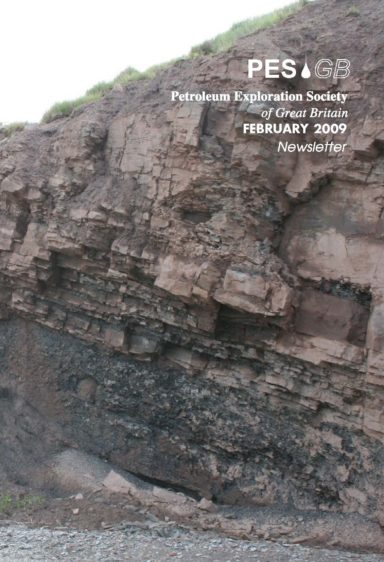PESGB February 2009
President’s Page- Jon Gluyas
On January 13th 2009 the new PESGB Council met for the first time. The meeting provided an opportunity to thank the outgoing officers and welcome the new ones. Steve Pickering (Past President), Henry Charlampowicz (Treasurer) and Brian Robertson (Aberdeen Director) all retired. To each we owe considerable thanks for their contribution to the successful running of the PESGB. In their stead are Henry Allen (President-Elect), Ruth Manson (Treasurer) and Andy Leonard (Aberdeen Director Elect). I look forward to working with Henry, Ruth & Andy during 2009. In addition, I am also pleased to report that Barrie Wells was re-elected as Newsletter Editor. The newsletter is I believe the most prominent face of the PESGB, delivered to our membership of over 5300 for eleven months each year. I am delighted that the PESGB can rely on Barrie’s skills and excellence to continue to deliver outstanding newsletters for the next few years.
The President’s Page allows its authors the liberty of committing to print the musings of a wandering mind and in consequence I will not apologise for the non-sequitur which separates this and the preceding paragraph. This month sees the 200th anniversary of the birth of one of the greatest geologists the world has ever seen. On 12th February 1809 Charles Robert Darwin was born in Shropshire, England. Grandson of physician Erasmus Darwin and Josiah Wedgewood (the potter), Charles Darwin became famous, rich and revered (though to some reviled) following publication of this 1859 book On the Origin of Species. The first print run of 1250 copies of the book sold out on the first day of publication. I would like to examine two elements of Darwin’s life and times which I believe have resonance for the PESGB as our Society and its contribution to society in general. Darwin’s life is inexorably linked with On the Origin of Species and his journey on HMS
Beagle to the Galapagos. But it was more than observations on finch diversity on the islands which led Darwin towards his theory of evolution. For example, he was the first to recognise the link between earthquakes and volcanic activity. Darwin combined his wide ranging observations on the fossils of extinct mammals, atolls of the Cocos Islands, the Falklands Islands Fox and other topics with acutely detailed investigations of barnacles and worms. Indeed his eight years work on barnacles earned him the Royal Society’s Royal Medal and promoted his reputation as a biologist as well as geologist. The lesson I draw is that we commonly consider ourselves as being explorers or producers (of petroleum). We concentrate on either the big picture or the detailed picture. Darwin made both his bailiwick – he got the whole picture.
For those in our industry working mature petroleum provinces let us not forget to stand back occasionally and take in the big regional view to match our precise field analysis it may pay dividends!
The second element to explore from Darwin’s life is that science was prominent in society at the time – witness the rapid sale of his and many other science books at that time. Science was seen as good, as progress and important. For example, about 20 members of the UK’s House of Lords were, like Darwin, Fellows of the Geological Society. What percentage of society today would recognise the contribution of scientists to the development of, say, the North Sea’s petroleum resource, let alone the value of that resource to the country?


